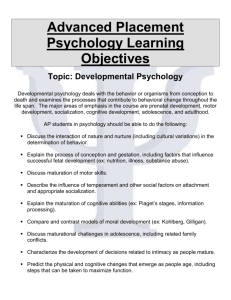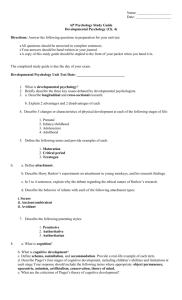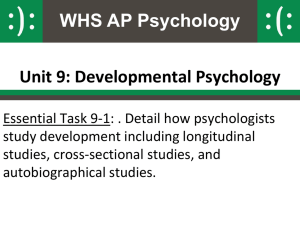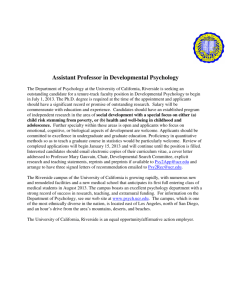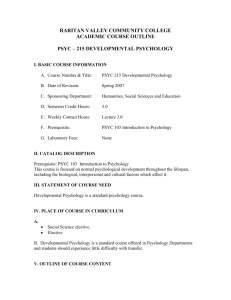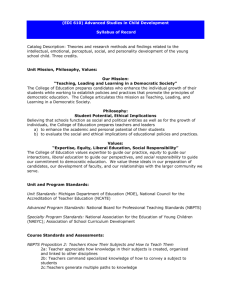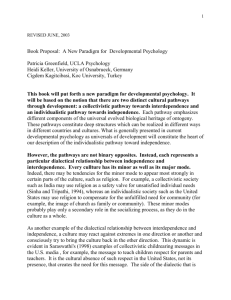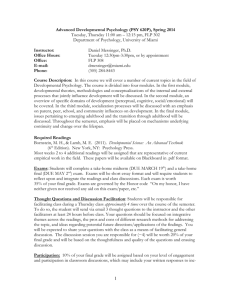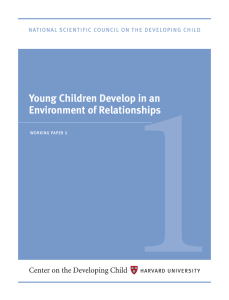Prof. Michal Perlman
advertisement
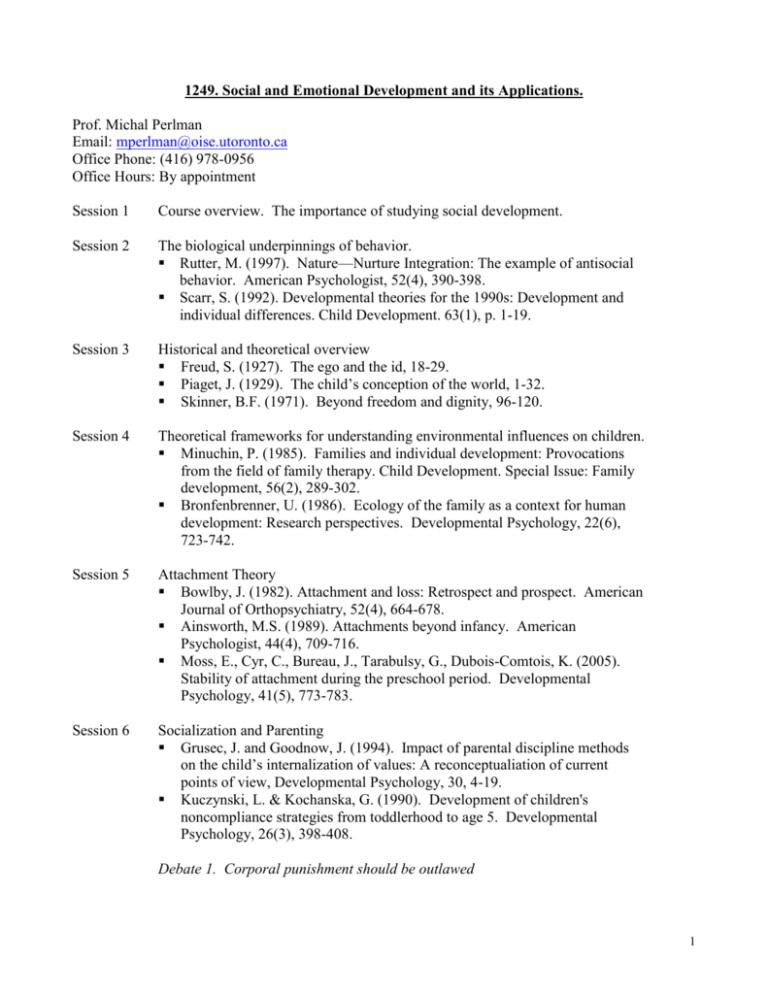
1249. Social and Emotional Development and its Applications. Prof. Michal Perlman Email: mperlman@oise.utoronto.ca Office Phone: (416) 978-0956 Office Hours: By appointment Session 1 Course overview. The importance of studying social development. Session 2 The biological underpinnings of behavior. Rutter, M. (1997). Nature—Nurture Integration: The example of antisocial behavior. American Psychologist, 52(4), 390-398. Scarr, S. (1992). Developmental theories for the 1990s: Development and individual differences. Child Development. 63(1), p. 1-19. Session 3 Historical and theoretical overview Freud, S. (1927). The ego and the id, 18-29. Piaget, J. (1929). The child’s conception of the world, 1-32. Skinner, B.F. (1971). Beyond freedom and dignity, 96-120. Session 4 Theoretical frameworks for understanding environmental influences on children. Minuchin, P. (1985). Families and individual development: Provocations from the field of family therapy. Child Development. Special Issue: Family development, 56(2), 289-302. Bronfenbrenner, U. (1986). Ecology of the family as a context for human development: Research perspectives. Developmental Psychology, 22(6), 723-742. Session 5 Attachment Theory Bowlby, J. (1982). Attachment and loss: Retrospect and prospect. American Journal of Orthopsychiatry, 52(4), 664-678. Ainsworth, M.S. (1989). Attachments beyond infancy. American Psychologist, 44(4), 709-716. Moss, E., Cyr, C., Bureau, J., Tarabulsy, G., Dubois-Comtois, K. (2005). Stability of attachment during the preschool period. Developmental Psychology, 41(5), 773-783. Session 6 Socialization and Parenting Grusec, J. and Goodnow, J. (1994). Impact of parental discipline methods on the child’s internalization of values: A reconceptualiation of current points of view, Developmental Psychology, 30, 4-19. Kuczynski, L. & Kochanska, G. (1990). Development of children's noncompliance strategies from toddlerhood to age 5. Developmental Psychology, 26(3), 398-408. Debate 1. Corporal punishment should be outlawed 1 Session 7 Peers and children’s friendships: implications for social and emotional development Rubin, K., Coplan, R., Nelson, L., Cheah, C. & Lagace-Sequin, D. (2001). Peer relationships in childhood. In Bornstein and Lamb (Eds.). Developmental Psychology, 4th edition. Mahwah, NJ: LEA. Coplan, R.J., Rubins, K.H., Fox, N.A., Calkings, S.D., Stewart, S.L. (1994). Being along, playing alone, and acting alone: Distinguishing among reticence and passive and active solitude in young children. Child Development, 65, 129-137. Debate 2. Boys are more aggressive than girls. Session 8 Exposure to anger, conflict and divorce Amato, P.R. & Keith, B. (1991). Parental divorce and the well-being of children: A meta-analysis. Psychological Bulletin, 110(1), 26-46. Amato, P.R. (2001). Children of divorce in the 1990s: An update of the Amator and Keith (1991) Meta-Analysis. Journal of Family Psychology, 15(3), 355-370. Davies, P.T. & Cummings, E.M. (1995). Children's emotions as organizers of their reactions to interadult anger: A functionalist perspective. Developmental Psychology, 31(4), 677-68 Debate 3. Couples should stay together for the sake of the children. Session 9 Media influences on children’s aggression and other social and emotional outcomes. Jordan, A. (2004). The role of media in children’s development: An ecological perspective. Developmental and Behavioral Pediatrics, 25(3), p. 196 – 206. Cole, C.F., Arafat, C., Tidhar, C., Tafesh, W.Z., Fox, N.A., Killen, M., Ardila-Rey, A., Leavitt, L.A., Lesser, G., Richmane, B.A. & Yung, F. (2003). The educational impact of Rechov Sumsum/Shara’a Simsim: A Sesame Street television series to promote respect and understanding among children living in Israel, the West Bank, and Gaza. International Journal of Behavioral Development, 27(5), 409-422. Debate 4. Exposure to aggressive media is bad for children. Session 10 Out-of-home care. What are its effects on children’s affective and social development Lamb, M. (1998). Non-parental Child Care: Context, Quality, Correlates, and Consequences. Handbook of Child Psychology. Scarr, S. (1998). American child care today. American Psychologist, 53(2), 1998, 95-108. Debate 5: Out-of-home care is bad for children. 2 Session 11 Early Childhood Education Policy. The Ontario policy landscape. With our best future in mind: Implementing Early Learning in Ontario, Charles Pascal. Available Online at: http://www.ontario.ca/ontprodconsume/groups/content/@gopsp/@initiative/doc uments/document/ont06_018899.pdf Guest Speaker: Brooke Fletcher, understanding quality in early childhood education settings. Deabate 6: Certified teachers should staff early childhood education classrooms Session 12 Poster Session. 3
